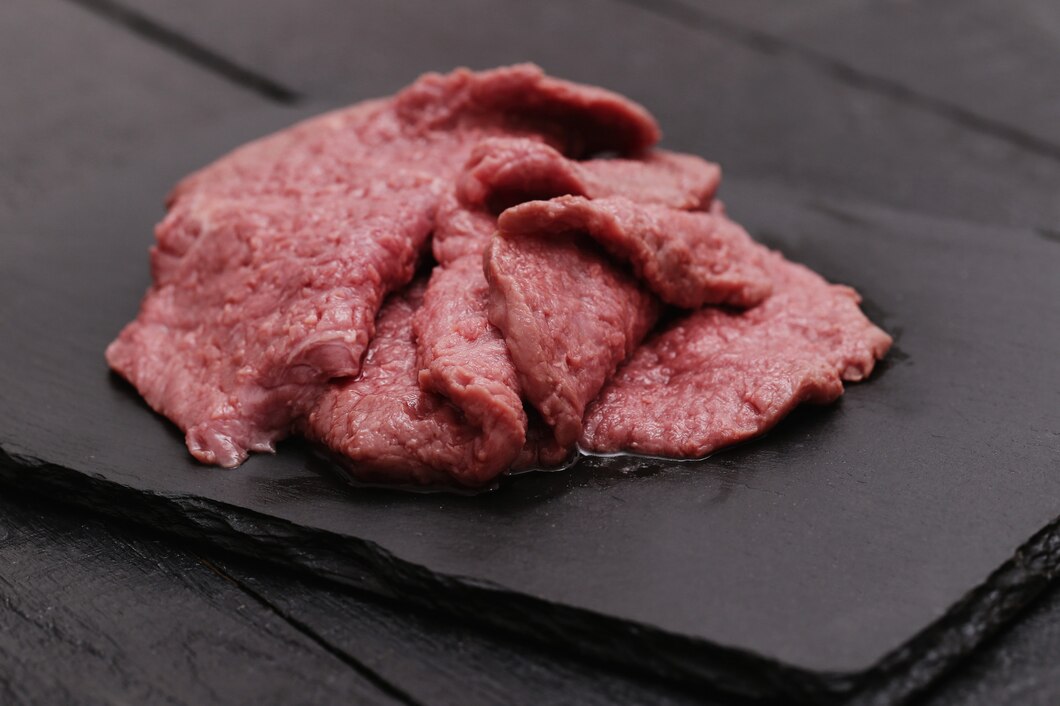What Raw Dog Food Can Do For Your Pet’s Health

Table Of Contents
Over the years, raw dog food diets have skyrocketed in popularity, as they’re known to offer pets optimal nutrition.
This contributes to a growing understanding of the importance of aligning dogs’ diets with their biological needs.
The world of raw dog food is a minefield, and the following guide is here to help you navigate it. After all, raw dog food boasts a number of benefits; however, there are various considerations for pet owners and a handful of tips that they should follow.
Navigating the World of Raw Dog Food

A raw dog food diet is otherwise known as the Biologically Appropriate Raw Food (BARF) diet, and it stems from the premise of feeding dogs food that closely resembles what they would eat in the wild.
Typically, this diet consists of raw meat, bones, organs, and vegetables in the absence of grains, fillers, and artificial additives that are typically used to bulk out commercial pet food. With raw feeding, pet owners can provide their dogs with a diet that’s rich in essential nutrients and free from potentially harmful ingredients.
Optimal Nutrition
Nutritional superiority is what sets raw dog food apart from its artificial counterparts. High-quality proteins, essential fatty acids, vitamins, and minerals can be found in raw diets, providing dogs with a balanced and biologically appropriate diet.
The nutrient-dense nature of a raw-feeding diet works to support optimal health, improve coat condition, and boost immune function in dogs. Similarly, raw foods present natural enzymes that are thought to assist with digestion and nutrient absorption, which leads to improved health for dogs.
Raw dog food delivers essential nutrients in their most natural form, which facilitates improved absorption and utilization by the body. Muscle meat, organs, bones, and other proteins ensure a complete amino acid profile while supporting muscle development and overall vitality.
What’s more, the risk of allergic reactions and digestive issues is significantly reduced, thanks to the absence of fillers and additives. From this, dogs are left with better overall health and well-being.
Improved Digestive Health
Many dogs encounter digestive health complications, and it’s this that pushes owners to make the switch to a raw food diet. Food sensitivities, allergies, and gastrointestinal upset can all be addressed with a raw diet. This is because this mode of consumption is typically easier to digest for dogs than processed foods, as the common allergens and artificial additives are left out.
Meanwhile, raw food is packed full of natural enzymes that work to assist with healthy digestion and reduce the likelihood of gastrointestinal issues taking hold. With improved digestive health comes fewer instances of diarrhea, constipation, and other digestive problems, which naturally leads to a happier and healthier dog.
Raw dog food is gentle on the digestive system, meaning it can alleviate symptoms of food sensitivities and allergies in dogs. Without grains and artificial additives, it becomes less likely that a dog will suffer from allergic reactions.
Similarly, natural enzymes work to break down food, promote smoother digestion, and assist with nutrient absorption. What’s more, raw bones in the diet work to maintain healthy gut flora and promote regular bowel movements.
Weight and Energy Management
In order for dogs to lead active and fulfilling lives, it’s crucial that they maintain a healthy weight. With raw dog food, dog owners are given greater control over their dogs’ diets due to the precise portioning and ingredient selection involved.
Raw diets are packed full of protein, and this supports the development of lean muscle and the promotion of satiety, which works to assist with weight management efforts. Similarly, raw food provides natural energy, which fuels dogs’ active lifestyles, contributing to boosted stamina.
Since raw dog food provides protein and nutrients, it promotes a lean body composition. It’s these proteins and nutrients that boost muscle development and reduce the risk of excess weight gain. On top of this, a raw diet can regulate blood sugar levels due to the absence of carbohydrates and fillers.
This works to prevent spikes and crashes, which can result in energy fluctuations, supporting the active lifestyle of dogs and enabling them to maintain optimal health throughout their lives.
Oral Hygiene and Health

Since a raw dog food diet requires dogs to chew on raw, meaty bones, this can improve their oral health. This is because chewing on bones can remove plaque and tartar buildup on dogs’ teeth, which can minimize the risk of periodontal disease and promote improved dental hygiene.
What’s more, chewing on bones can alleviate boredom and reduce destructive chewing behaviors, as it acts as a mode of mental stimulation for dogs. With the help of raw bones, dogs can feel the benefit of cleaner and stronger teeth and healthier gums. This also reduces the need for dental cleanings and extractions.
Not only does chewing on raw bones facilitate the removal of plaque and tartar, but it also strengthens jaw muscles and promotes mental stimulation.
A dog’s natural instincts can be awoken by the act of chewing on a bone, which then provides an outlet for pent-up energy, and also reduces the likelihood of destructive chewing behaviors.
On top of this, chewing on raw bones encourages saliva production; this saliva contains enzymes, which further support dental health by breaking down food particles and preventing plaque buildup.
Eco Concerns
While raw dog food diets are predominantly known for their health benefits, some dog owners are drawn in by the notion of a reduced environmental impact. There is less processing and packaging involved in raw diets than in commercial pet foods.
From this, a smaller carbon footprint is achieved. Generally speaking, dogs leave a huge carbon pawprint, and a raw diet helps their owners make a conscious effort to reduce this.
Raw food diets are some of the more sustainable practices in the pet food industry, meaning they align with the broader trend towards environmentally friendly living as a whole.
Ultimately, pet owners everywhere are keen to make choices that leave a positive impact on their four-legged friends and the planet alike.
Read Also:
Tags:
You May Also Like

April 26, 2024
Adopting Pets With Past Trauma: Tips For Pet Care

August 16, 2022
5 Things You Should Know Before Owning A Cat

June 9, 2022






















